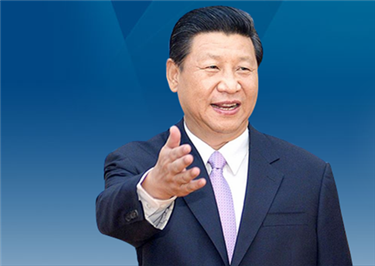Explanation of the Resolution of the Central Committee of the Communist Party of China on the Major Achievements and Historical Experience of the Party over the Past Century
On behalf of the Political Bureau of the 19th Central Committee of the Communist Party of China (CPC), I will now brief you on the Resolution of the CPC Central Committee on the Major Achievements and Historical Experience of the Party over the Past Century and related issues.
I. Considerations on the Agenda of the Sixth Plenary Session of the 19th CPC Central Committee
Our Party has always attached great importance to reviewing its historical experience. As early as in the Yan'an period, Comrade Mao Zedong pointed out, "We will not be able to achieve greater success unless we have a clear understanding of our history and of the roads we have traveled."
In 1945, at the critical juncture for securing final victory in the War of Resistance against Japanese Aggression, the Sixth CPC Central Committee convened its seventh plenary session and adopted the Resolution on Certain Questions in the History of Our Party. The resolution reviewed the history of the Party and the experience it had gained and lessons it had learned since its founding in 1921, especially those in the period between the fourth plenary session of the Sixth Central Committee in January 1931 and the Zunyi Meeting in January 1935. It drew conclusions on major historical issues of the Party, leading to a broad consensus among all Party members, particularly high-ranking officials, on fundamental questions pertaining to the Chinese revolution. It served to strengthen the solidarity of the Party, paved the way for the convocation of the Seventh CPC National Congress, and helped advance the Chinese revolution significantly.
When our country entered a new period marked by the launch of reform and opening up, Comrade Deng Xiaoping noted, "The experience of successes is invaluable, and so are the lessons learned from mistakes and setbacks. Principles and policies formulated on the basis of the experience gained and lessons learned will unify all Party members in thinking. The unity so formed is most reliable."
In 1981, at its sixth plenary session, the 11th Party Central Committee adopted the Resolution on Certain Questions in the History of Our Party since the Founding of the People's Republic of China. The resolution reviewed the Party's history in the period before the founding of the People's Republic and summarized the experience it had gained in the course of socialist revolution and construction.
The resolution gave assessments of certain major events and important figures, particularly a correct appraisal of Comrade Mao Zedong and Mao Zedong Thought. It drew a clear distinction between right and wrong and corrected the erroneous "Leftist" and Rightist viewpoints existing at the time. Through the resolution, the Party came to a clear consensus and was more united than ever in support of a forward-looking approach. All this provided a strong impetus to the Party's endeavors in reform, opening up, and socialist modernization.
Seventy-six years have passed since the adoption of the Party's first resolution on historical issues, and 40 years since the second. The past four decades have witnessed tremendous progress in the cause of the Party and the country and tremendous advances for the Party in theoretical and practical terms.
We have now arrived at a new historic milestone. As we look back and set our sights on the future, we have both an objective need and the subjective conditions for a full review of our Party's major achievements and historical experience over the past century, especially those in the 40-plus years of reform and opening up.
The Central Committee considers it important in both a practical and historical sense to have a comprehensive review of the major achievements and historical experience of the Party over the past century as we celebrate its centenary and the fulfillment of the First Centenary Goal of building a moderately prosperous society in all respects and move on toward the Second Centenary Goal of building China into a great modern socialist country in all respects. This review will help build a broader consensus and stronger unity in will and action among all members and rally and lead Chinese people of all ethnic groups in achieving new and great success in building socialism with Chinese characteristics in the new era.
The Central Committee understands that the Party has gone through an extraordinary journey over the past century. The great endeavors of the Party span a long period of time, cover a wide range of fields, and involve many issues that merit our careful study. As a general requirement, we need to review our history and understand the underlying dynamics of its development so as to prepare for the future with greater confidence.
To this end, we need to relive the glories of the Party and appreciate how the Party has rallied and led the Chinese people in making magnificent achievements. We need to take stock of the invaluable experience the Party has gained in carrying out revolution, construction, and reform, and summarize the Party's theories and practices that have proved successful in advancing the cause of the Party and the country since the 18th CPC National Congress.
To be more specific, we need to revisit the Party's century-long history of leading the people in carrying out revolution, construction, and reform. We need to review the Party's great historical course of achieving one victory after another and the historic accomplishments the Party has achieved in the interests of the country and the nation.
We need to revisit the Party's century-long history in which the Party has advanced Marxism in the Chinese context by adapting the basic tenets of Marxism to China's realities and fine traditional culture, and we need to gain a deeper understanding of the Party's innovative theories for the new era.
We need to revisit the Party's century-long history in which the Party has maintained unity and upheld the Central Committee's authority and its centralized, unified leadership. We need to appreciate the significance of enhancing the Party's political development, which is a distinctive feature and political strength of a Marxist party such as ours.
We need to revisit the Party's century-long journey in pursuit of happiness for the Chinese people and rejuvenation for the Chinese nation. We must always bear in mind that the Party and the people are inextricably connected and rise and fall together. It is only with such understanding that we Party members can better devote ourselves to the benefit of the people and rely on them in our endeavor for greater accomplishments.
We need to revisit the Party's century-long journey in which it has grown stronger through self-improvement and self-reform. We must never falter in exercising full and rigorous self-governance of the Party and must see this as a mission that is forever ongoing so as to make sure that the Party always remains a powerful leadership core in the endeavor to uphold and develop socialism with Chinese characteristics in the new era.
We need to fully appreciate the laws and prevailing trends of history, seize the historical initiative in the cause of the Party and the country throughout our new journey in the new era, and galvanize even greater courage and strength for keeping to our set goals and striding ahead with pride and confidence.
The Central Committee considers it essential to follow the methodology of dialectical and historical materialism in the review of the Party's major achievements and historical experience over the past century. We need to look at the Party's history from a concrete, objective, and holistic perspective while recognizing that it is interconnected and evolving.
We need to maintain a rational outlook on Party history and see history from a broader perspective so as to develop an accurate understanding of the underlying trends and defining features of the CPC's history of evolution.
We need to properly address the mistakes and setbacks that have occurred on the Party's path forward. We should draw experience from our successes and learn lessons from our mistakes so as to score new victories.
We need to do better at setting things straight, taking a clear-cut stance against historical nihilism, strengthening ideological guidance and theoretical analysis, and clearing up confusion and misunderstandings over certain major questions in the Party's history.
The Central Committee has made it clear that the following are the top priorities in drafting the resolution to be adopted at this session:







